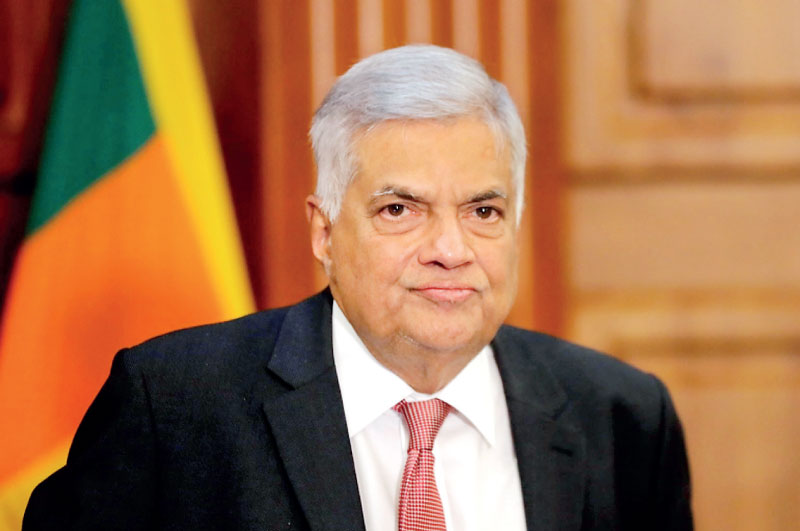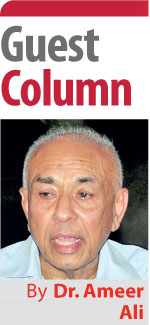Thursday Feb 19, 2026
Thursday Feb 19, 2026
Wednesday, 21 December 2022 00:01 - - {{hitsCtrl.values.hits}}

It is high time that RW’s economic marathon be turned into a relay race instead and the baton transferred to a new generation of leaders
 At the recent Leo Day celebrations in Royal College, the most distinguished of its old boys, President Ranil Wickremesinghe, invited the youth of the country to join him in a 25-year marathon to transform Sri Lanka into a First World Nation. To honour that invitation, he announced the appointment of a young member for the oversight committees to look into solutions to the current crisis facing the nation.
At the recent Leo Day celebrations in Royal College, the most distinguished of its old boys, President Ranil Wickremesinghe, invited the youth of the country to join him in a 25-year marathon to transform Sri Lanka into a First World Nation. To honour that invitation, he announced the appointment of a young member for the oversight committees to look into solutions to the current crisis facing the nation.
Having dismissed the Aragalaya as a destructive element and determined to prevent its recurrence with the full force of state armoury, this overture to the youth is RW’s olive branch, but with a hidden message that there would not be any systemic change, the core demand of Aragalaya. With this invitation to the youth and a similar one to the minorities for talks on the national question, RW has emerged as the guardian of a system that ruined this nation in the first place.
But, thanks to the Aragalaya men and women, who caught everyone by surprise and created a political tumult that led to a chain of events ending in today’s Wickremesinghe interregnum, the term systemic change has received wider currency in the debate over Sri Lanka’s past, present and future. Although the youngsters introduced that phrase, they did not explain what it meant to the public except to sloganise it into a couple of demands, “Gota Go Home” and “No 225”. The first had been materialised while the second is not. But the essence of systemic change has been diluted by the RW regime that it now stands to mean anything and everything that the regime undertakes in the name of an elusive peace, stability and prosperity.
To put it simply, a system is a group of interacting or interrelated elements that act according to a set of rules and ideals to form a unified whole. Accordingly, Sri Lanka’s ruling system with its interrelated elements of political governance, economic management, cultural progress and social cohesion are all unified by one holistic but contentious ideal: Sinhala-Buddhist majoritarianism. This ideal, born in the wake of independence after centuries of Christian rule, justifies its legitimacy on the basis of numerical strength and questionable historical and archaeological evidence.
As a means to maintain and protect this ideal, democracy was drained of its substance, economy was hijacked to serve primarily the interests of an ethnic majority, cultural heterogeneity being endangered with homogenising measures and social cohesion made conditional upon acceptance of Sinhala-Buddhist supremacy. Constitutions were designed accordingly, to uphold that ideal. In essence, the ideology of Sinhala-Buddhist majoritarianism provided the shape and content to the structure of governance, economy, culture and social cohesion. As a result, what came into being therefore was a system that was willing to legitimise even actions of illegality and immorality, so long as those actions were justified as undertaken in pursuance of the supreme ideal.
It was this leverage that opened the doors for the progressive erosion of democracy, planned economic mismanagement, politically injected administrative inefficiency and the intentional abuse of judicial independence. Needless to say, the constitutions that were made, unmade and remade by successive regimes remained committed to uphold the ideal while providing ample room for powerholders to interpret the constitutions to justify all what they did and without being accountable to the people who elected them.
This system is more than seven decades old. During that period the country had witnessed a series of ethnic riots, two insurgencies, at least one pogrom and a civil war. In each of these horrific episodes, state action whether in support of or against them was justified in the name of the ideal. The civil war that was fought and won with borrowed money provided the victors a social license for prodigality with public funds, which ultimately bankrupted the nation. The system included in its constituency, not only the government and its functionaries but also the private sector, the media, religious establishments, educational institutions, and, regrettably, even civil society organisations.
It is this system with its overarching ideal that needs to be changed. Whether one calls it a radical reformation or revolution does not matter. The change has to be wholesale and not piecemeal. To bring about that change a new generation of leaders and a new constitution based on secular values are absolute imperatives. That was the demand and mission of the Aragalaya youth. They were convinced that the 225 representatives currently seated in the parliament, all of whom are beneficiaries of the ruling system, are incapable of effecting that epochal transformation and hence their second slogan, “No 225”.
RW has categorically denied that change and his intentions and actions so far demonstrate that he would continue with the prevailing system with some fine tuning. He does not want to abandon the group that put him on the throne, and his own political party, UNP, is now reported to be contemplating in coalescing with PPP to fight the next election. His post-budget overtures to the youth and minorities should therefore be viewed in the context of this agenda.
The country needs a gender balanced transgenerational parliament to bring about a desperately needed systemic change. Such a change requires a new constitution based on secular democracy. It is one thing to accept the economic rationale for a tough budget in current circumstances. But it is totally a different thing to believe in the efficacy of the budget, given the system within which it is scheduled to operate. Even without the economic uncertainties arising from the world outside, the aspirations and targets of the budget could be sabotaged by the very elements that supported its passage enthusiastically in the parliament. It would be RW’s political suicide if he were to control their operation.
The Aragalaya youth has a constructive role to play in promoting systemic change. Political parties like NPP that are vying for power should realise this fundamental truth. These youth are not seeking violence, and Aragalaya did not start with violence. It was the stubbornness of a geriatric leadership refusing to listen to the youth and its readiness to destroy Aragalaya’s popularity that turned things ugly at the end.
RW, the man who benefited from this end, is now waving an olive branch to the youth to join his marathon but without conceding to their core demand. Draconian measures like the dreaded PTA are kept in reserve to force their cooperation. This is an awakened generation and its consent cannot be bought by piecemeal concessions and threats. With this crisis, the country needs a tabula rasa. It is high time that RW’s economic marathon be turned into a relay race instead and the baton transferred to a new generation of leaders.
(The writer is attached to Murdoch Business School, Murdoch University, Western Australia.)